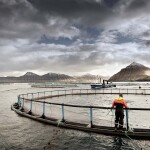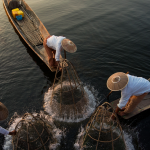If all of the key interests from across the entire fishing industry in the United Kingdom are factored in when negotiating the new post-Brexit regimes with the European Union, then the country’s departure from the bloc should present sufficient opportunity to thrive, according to Barrie Deas, chief executive of the National Federation of Fishermen's Organisations (NFFO).
Deas told delegates at the Shellfish Association of Great Britain (SAGB) Annual Conference in London that while U.K. fishermen must continue to endure extreme uncertainty while they wait for negotiations on trade and fisheries access to get going, the NFFO had been assured by the U.K. Secretary of State for Exiting the EU, David Davis, that fishing was a “totemic industry” for Brexit and that it was a priority issue in the departure negotiations.
“Fishing is a politically significant area and what we have had since the meeting with David Davis in August 2016 is very close engagement with the team at Defra (Department for Environment, Food and Rural Affairs) on what shape the negotiations should take, what our priorities are and the look of the industry post-Brexit,” he said.
The six “red lines” sought by the industry are:
- For the United Kingdom to be an independent coastal state
- A new deal on quota shares to reflect resources in U.K. waters
- An exclusive 12-mile zone to protect inshore fisheries
- Negotiated access to the U.K. exclusive economic zone (EEZ) outside the 12-mile zone where there are proportionate benefits
- An opportunity to shape the U.K. fisheries regime to the contours of its fleets
- As free a flow as possible in trade between the United Kingdom and the E.U.
Expecting around 15 months of talks ahead, Deas stressed that the United Kingdom had “a strong hand to play,” because of the high dependence of European fleets on U.K. waters. Belgium, for example, catches 80 percent of its fish in U.K. waters, while the figure is closer to 85 percent for the Danish fleet.
But he also cautioned that while U.K. fishing may be totemic, it is also very small in the grand scheme of the country’s economy – representing just 0.8 percent of gross domestic product (GDP). As such, he said that he was “acutely aware” of the great danger that other interests and political ambitions could take precedence – rendering fishing a trade-off victim for other deals.
The shellfish trade, in particular, could be particularly affected by the negotiations, he said. The E.U. Common Fisheries Policy (CFP) has had minimal direct impact on this sector for the past 30 years because, with the exception of nephrops, it is based on non-quota species and there is no unwanted mortality arising from discards. Instead, the main regulatory instrument has been minimum landing sizes.
“The focus of Brexit has not been on shellfish. It’s about access to waters and quota shares,” Deas said.
Nevertheless, within the shellfish sector, market issues play a very significant role and sales are highly reliant on the European market. For example, some 85 percent of U.K.-landed crab is currently sold into the E.U., and at the moment exporters have no idea what the post-Brexit trading environment will be for these products.
“It is important for us to recognize that shellfish has distinctive and, to some degree, different interests to the rest of the industry. Overall, Brexit offers our fishing industry a big opportunity. We will become an independent coastal state with significant resources within our exclusive economic zone. But shellfish has little or nothing to gain and quite a lot to lose because of its dependence on European markets," Deas said. "We want to sell, and I’m pretty sure they want to buy – but the transition could be turbulent. I think that the diversity of all our fishing fleets should be taken into account both during the exit negotiations and in the evolution of the post-Brexit regime, he said.






